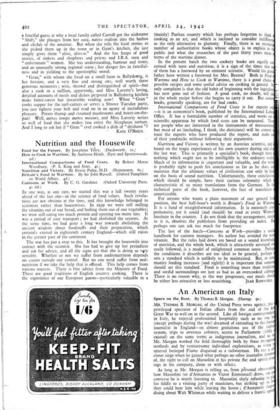Nutrition and the Housewife
Food for the Future. By Josephine Terry. (Duckworth. as.) International Comparisons of Food Costs. By Robert Morse Woodbury. (P. S. King and Sons. 4s.)
IN one way, at any rate, we started this war a full twenty years ahead of the last one—in the science of food values. Such revolu- tions are not obvious at the time, and this knowledge belonged to scientists rather than housewives. In 1939 we were still milling the vitamins out of our bread, and boiling them out of our vegetables; we were still eating too much protein and opening too many tins. It was a period of easy transport ; we had abolished the seasons. At the same time, we had gone a long way towards abolishing the ancient wisdom about foodstuffs and their preparation, which certainly existed in eighteenth century England—which still exists in the greater part of the continent.
The war has put a stop to this. It has brought the housewife into contact with the scientist. She has had to give up her prejudices and ask for advice, and all the signs are that she is doing so vsry sensibly. Whether or not we suffer from undernutrition depends on causes outside our control. But no one need suffer from mal- nutrition if we take the help that is offered. This help comes from various sources. There is free advice from the Ministry of Food. There are good traditions of English country cooking. There is the experience of our European guests—particularly valuable to a
(mainly) Puritan country which has perhaps forgotten to think cooking as an art,' and which is inclined to consider indiffe as the only alternative to gluttony. Finally, there is an incr number of authoritative books whose object is to explain to public just what the researches of the past thirty years mean terms of the wartime dinner.
In the present batch the two cookery books are equally ceined with taste and nutrition; it is a sign of the times that of them has a foreword by an eminent scientist. Would his g father have written a foreword for Mrs. Beeton? Both in Food Wartime and How to Cook in Wartime, there is a good choice possible recipes and some useful advice on cooking in general. M only complaint is that the old habit of beginning with the ingredien has now gone out of fashion. A good cook, no doubt, will in the whole recipe before she begins to carry it out. But cook books, generally speaking, are for bad cooks.
International Comparisons of Food Costs is for experts and —it is . an economist's book, published by the International La Office. It has a formidable number of statistics, and works out scientific apparatus by which food costs can be measured. Th are people who are interested in the instruments of measuremen but most of us (including, I think, the dieticians) will be content trust the experts who have produced the report, and make u of their yardsticks without following their arguments.
Nutrition and Victory is written by an Austrian scientist, and based on the tragic experiences of his own country during and aft the last war. This is primarily a specialist's book, though there nothing which ought not to be intelligible to the ordinary reade Much of its information is 'important and valuable, and the writ is probably right to push his conclusions as far as he does, maintain that the ultimate values of civilisation can only be bu on the basis of sound nutrition. Unfortunately, these conclusion which should be simple, have their curious solemnity which characteristic of so many translations from the German. In technical parts of the book, however, the fact of translation unnoticeable.
For anyone who wants a plain statement of our general f position, the best half-hour's worth is Britain's Food in Wartzm It is a fund of straightforward information. It is extremely co prehensive, yet it could (and should) 'be read at every Women Institute in the country. I do not think that the arrangement, situp as it is, absolves the publishers from providing an index. B perhaps one can ask too much for fourpence.
The last of the batch—Canteens at Work—provides a usef handbook for canteen manager's.. Its author has avoided the wo vitamin. But the rules laid down are based on a sound knowled of nutrition, and the whole book, which is attractively arranged easily followed, is a model of enlightened common sense. Perha the conditions it describes are too ideal to be general, perhaps sets a standard which is unlikely to be maintained. But, as co munity feeding increases (and rightly) it is important that someon should set this standard. Food is something more than median and sordid surroundings are just as bad as an overcooked cabbag There is no reason why, as the war progresses, our meals sh be either less attractive or less nourishing. JEAN ROWNTREE.






















 Previous page
Previous page